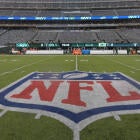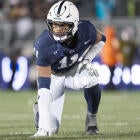The first round of the 2020 NFL Draft will still be conducted April 23. For now, the spring league meeting will still take place on May 19 in Marina Del Ray, Calif. And, for now and for what is likely the next month-plus, the NFL regular season will begin on Thursday, Sept. 10.
During a global pandemic, North America's greatest sports league is still not officially discussing contingency plans for the start of its season.
"All of our discussions," said NFL general counsel Jeff Pash on a conference call Tuesday, "all of our focus, has been on a normal, traditional season, starting on time, playing in front of fans, in our regular stadiums and going through a full 16-game regular season and a full set of playoffs. That's our focus."
The league is not being defiant or arrogant. It's simply making a practical point.
If our collective efforts to flatten the curve work, if there is no longer a risk of a second spike in cases, and especially if there's a vaccine by late summer, the NFL season can reasonably take place as scheduled.
"That's our expectation," Pash said. "Am I certain? I'm not certain I'll be here tomorrow. But I'm planning on it. And the same thing. We're planning on having the full season. That's what we talked about."
There are plenty other issues for the league to work through before deciding what to do with a season that's still more than 23 weeks away from beginning. The NFL continues to work out the kinks of April's draft, with EVP of football operations Troy Vincent telling media the competition committee is considering emergency bonus time for teams hoping to conduct a trade in the draft but hampered by potential logistical issues being outside their team facilities.
The league is also working through how its clubs can use virtual meetings like Zoom that are both competitively equitable and adhere to CBA regulations on time at "work." Things like the aforementioned spring meeting in May don't have to be deeply considered just yet since the in-person meeting can easily be translated to a teleconference just as the league did with team owners and presidents this week.
People I've spoken to around the league are already expecting OTAs to be wiped out entirely. One coach mentioned to me last week that teams could wind up having three or so weeks of training camp followed closely by the start of the regular season.
What encourages the league, at least for now, is that models indicate "how the curve has trended down and tailed off in other countries" and how that can be applied here.
Team owners and players are both motivated by collective billions to have the entire season played like normal. Once the league starts publicly talking about contingencies, money starts flying out of the window. If the 2020 season isn't business as usual for the NFL, there are two main alternatives I could see.
Playing in empty stadiums
With the need to fulfill TV contracts and if bringing together 70,000 people in one place for three-plus hours remains a bad idea with COVID-19 hanging over us, the league would possibly opt to play games in empty stadiums.
By that point, I hope, there would be enough tests available to regularly test players, staff and officials without the NFL owning a disproportionate amount of tests. The pro is obvious here: the games would be played as scheduled. The cons are trying, though.
Teams would lose out on ticket revenue. Fans would be stripped of their experiences. Season-ticket holders would be tied up in knots with prepayments. Home teams would lose the biggest element of home-field advantage.
But the games could be played without adding logistical headaches to a process that already takes three-or-so months to schedule a season.
Shortening the season
Sliding a 16-game regular season and full set of playoffs back a month or two would create too many logistical issues for 32 individual clubs and their respective stadiums and cities. Whether teams play with or without fans, the league could shorten the season by some degree while keeping a competitive and equitable slate for all 32 teams.
Recall the 1998-99 NBA season that was shortened from 82 games to a 50-game schedule due to a strike. Nonconference games were the first on the chopping block for the NBA, and the same would happen with the NFL. Each NFL team plays four nonconference games and 12 within their own conference, and I could see those four being the first to go in a truncated season.
(The season couldn't get too short, though. The league would have to protect the six divisional games plus the four games against teams in a division within their conference. The two games against teams from the other two divisions based on division seeding would be next on the chopping block, taking the 12-game season to 10 games.)
The league can use the same tiebreaker formula to determine postseason seedings since all games would be within the conference. It would essentially be the old AFL vs. NFL from the late 1960s, with the champion from each conference having the ability to face each other just once all year in the title game.
League officials did not want to guess on a "drop dead" date, meaning the date they'd have to decide whether games would be played or not. It's reasonable to assume as long as federal or state mandates against public gatherings do not extend into August, there's no motivation for the NFL to begin changing its stance on the start of the season.
And this point, we'll all be thankful if we can safely assemble in stadiums come September.
![[object Object] Logo](https://sportshub.cbsistatic.com/i/2020/04/22/e9ceb731-8b3f-4c60-98fe-090ab66a2997/screen-shot-2020-04-22-at-11-04-56-am.png)


















